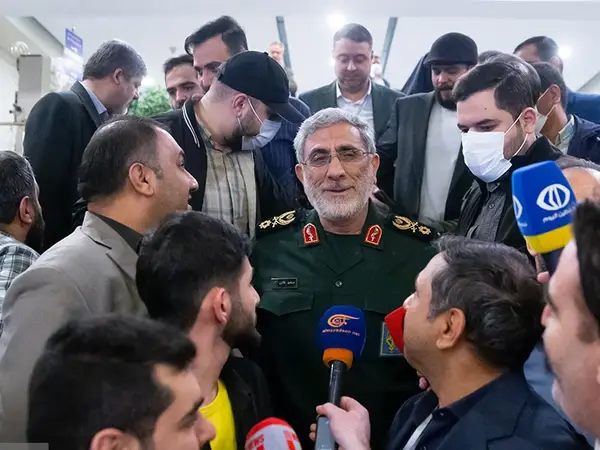Iran has humiliated Israel by organizing “Islamic resistance”, commander of the Revolutionary Guard’s Quds Force, Esmail Qaani said in Tehran on Wednesday.
“At this point, Israel has reached a level of humiliation that it has surrounded itself with barbed wire and radars to prevent infiltration,” Qaani told a gathering of young clerics.
The commander who replaced Qassem Soleimani after his killing by the order of former US President Donald Trump in January 2020, is in charge of Tehran’s militant proxies in the region, including Palestinian groups and the Lebanese Hezbollah.
Although Qaani is not a strong operator like his predecessor who organized a large network of proxy forces, Iran succeeded in inflaming tensions between Israel and Palestinian militant groups this year, which led to military clashes in April.
Qaani’s remarks came as Islamic Republic’s president Ebrahim Raisi was in Damascus for a two-day visit, for the first time by an Iranian head of state since civil war broke out in 2011.
Iran has a large military presence in Syria, where Israel says Tehran is building up forces to threaten its northern border and use the country as a supply route to arm Hezbollah in Lebanon.
Qaani boasted that because of Tehran’s efforts to instill “the spirit of resistance,” some days up to 30 attacks take place against Israel “that their media try to hide.”
He added that the Islamic Republic is so strong that “Today, America, Israel, NATO and others have mobilized” to destroy it.
Qaani’s remarks came as Iran seized a second oil tanker in the Persian Gulf in a span of days, despite the United States deploying a guided-missile submarine in the region in April.
The Bahrain-based US Fifth Fleet said Wednesday that the Panama-flagged oil tanker Niovi was seized by Iran's Islamic Revolutionary Guard Corps Navy (IRGCN) while passing through the narrow Strait of Hormuz.
The incident happened in international waters, as swarms of Iranian armed speed boats surrounded the vessel. It is not clear why the US Navy, which has a strong presence in the region, and was apparently aware of the unfolding seizure, did not intervene.
Asked by a reporter Wednesday why the United States does not respond to Iran’s actions, State Department Deputy Spokesperson Vedant Patel said, “When it comes to holding the – the malign Iranian regime accountable, we’ll continue to take steps to do whatever we can to protect the security of our allies and partners in the region, protect the security of the United States and its service members, and we continue to have a number of tools at our disposal.”
But clearly Tehran has decided to make oil shipping through the strategic Persian Gulf waters unsafe, potentially hurting vital oil traffic.
Saudi Arabia, which agreed to restore relations with the Islamic Republic in March after a seven-year hiatus, has not publicly reacted to Tehran’s actions in the Persian Gulf endangering oil shipments by its allies Bahrain and the United Arab Emirates.
It was expected that the Iranian regime would act more cautiously after emerging from its regional isolation following the agreement with Riyadh.
However, the calculus in Tehran might be different. The restoration of ties was brokered by China, which was seen as a blow to US influence in the Middle East. The Islamic Republic sees its alliance with China as a game changer.
“The shift in power from West to East has begun,” Qanaani said in his speech, referring to China becoming a diplomatic and military power in addition to its economic clout.
“In this shift the Islamic Republic should find its rightful place and with God’s help it will find it.”
